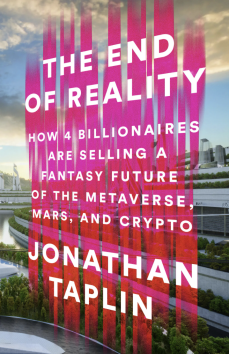How Four Billionaires Are Selling a Fantasy Future of the Metaverse, Mars, and Crypto
Jonathan Taplin
PublicAffairs ($30)
by Doug MacLeod
Jonathan Taplin takes on two roles—cynic and hardcore realist—in his newest book, The End of Reality: How Four Billionaires Are Selling a Fantasy Future of the Metaverse, Mars, and Crypto. Taplin sees the United States as going down a dangerous road of what he calls “techno-determinism,” which he argues has been sold to a naïve public by four anarcho-libertarian technocrats. These four men—Elon Musk, Peter Thiel, Mark Zuckerberg, and Marc Andreessen—promise projects that will “deliver us a bright future”: Web3, cryptocurrency, human life on Mars, and transhumanism. Taplin’s billionaire subjects propose that what is best for the world is not only the creation of new worlds and digitized economies but also the merging of technology and human life, disregarding the moral, political, and economic dangers that have already developed due to our avarice and incessant need for immortality.
Taplin expertly picks apart each of these self-appointed saviors and their Frankenstein’s monsters of modern technocracy—while also, for a lack of a better analogy, slapping readers across the face like Cher does to Nicholas Cage in Moonstruck: “Snap out of it!” While partisan in his prose, he retains a relatively objective tone by displaying facts without overt judgement—and by taking the history of propaganda as his context. Taplin acknowledges that the bamboozle has been going on since the days of Hitler and Goebbels, so he directs his disdain forward, at what he sees as its modern legacies: Trumpism, neoliberalism, the politico-media complex, and businessmen who exploit democracy’s gaps for personal gain. If the American public seems to follow these charlatans blindly, Taplin explains, it is because of an ideology of individualism and its barriers to collective understanding. Knowing this, writes Taplin, “all four Technocrats have constructed their companies in a way that stymies the ordinary feedback hoops that help leaders course correct.” Ultimately, he argues, the American experiment is disintegrating to a propaganda machine created by dictators in politics and technology—much like the Weimar Republic did in the early 1930s, but with a modern inflection: Technological advancements, the new face of power grabs, are designed to cause chaos to the point of disorientation and surrender.
How can Americans escape the hyper-unreal morass engineered by Big Tech to ensure unwavering loyalty to a transhuman enterprise? Taplin states that Americans need to resist rather than submit, and create a new age of realism devoted to a regenerative economy that place importance on cooperation, participation, responsibility, and innovation. Reality is right in front of us, Taplin urges, and it is filled with poverty, homelessness, illiteracy, xenophobia, misogyny, white supremacy, food insecurity, violence, and other problems that flashy, profit-focused inventions can’t fix: “Technocrats have no solutions to real problems; in fact they exacerbate them by draining money for ill-conceived space ventures or fomenting discord that gets in the way of solutions.”
As a coda, proof of Taplin’s statement recently materialized with the tragic death of five people who spent $250,000 apiece to see the Titanic’s steel skeleton; their vessel was supposed to have been “unsinkable,” yet cost-saving shortcuts in its design spelled doom. Taplin may be a cynic, but his argument in The End of Reality is valid and sobering.
Click below to purchase this book through Bookshop and support your local independent bookstore:
Rain Taxi Online Edition Fall 2023 | © Rain Taxi, Inc. 2023

